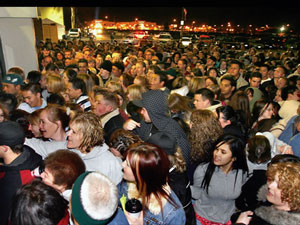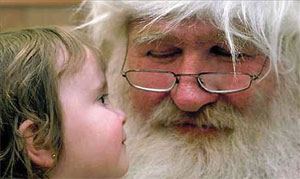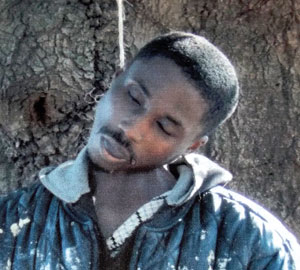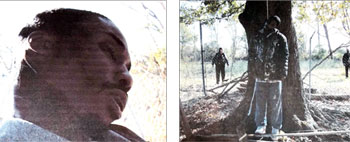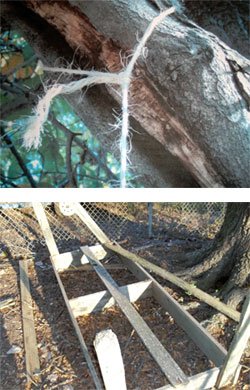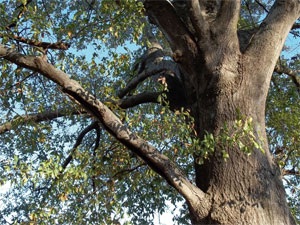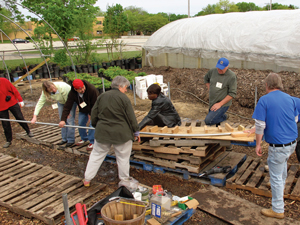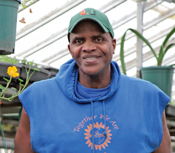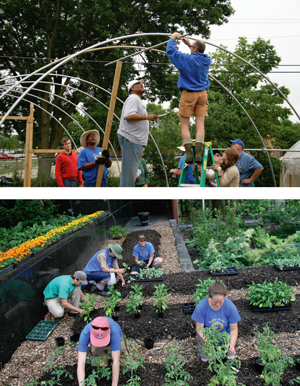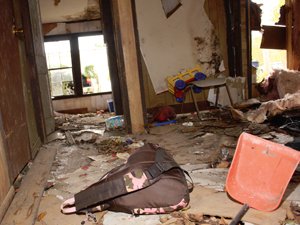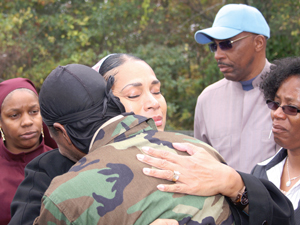Tough year ends, tougher times ahead?
By Charlene Muhammad, Askia Muhammad and Starla Muhammad -Staff Writers- | Last updated: Dec 29, 2010 - 4:58:30 PMWhat's your opinion on this article?
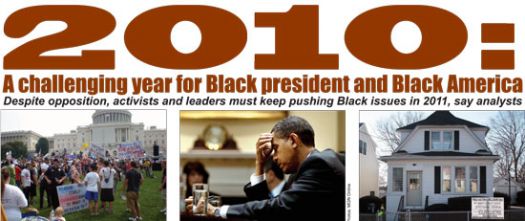 (L-R)Tea Party protest in Washington, DC.; President Obama during a meeting with
progressive leaders at the White House; Home in Springfi eld, Mass., under public auction foreclosure sale. |
(FinalCall.com) - Blacks in America entered 2010 with a sense of promise and hope that going into his second year in office; the country's first Black president might address more of their issues, such as chronic unemployment, nagging racism, and police brutality.
But hope turned to despair as unemployment rates and home foreclosures continued to rise, the country fell deeper into recession, and right wing conservatives attempted to block just about any effort pushed by the president to correct problems.
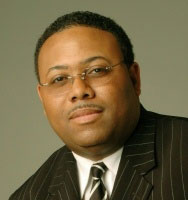 ‘Look, we have to be entrepreneurs, we have to start thinking about how do we cultivate our own money, cultivate our own food, cultivate our own positioning because once we start doing that then we realize that you know what, we don't need the government to save us.’ –Warren Ballentine,attorney and nationally syndicated Radio One talk show host |
“The Black community continues to have unemployment and poverty rates two-and-a-half to three-and-a-half times the rates for White folks in the midst of a recession that's hitting everybody very hard. Folks of color, and particularly Black folks, are being hit the hardest and that's not all that unusual,” said anti-racism activist and author Tim Wise., who is based in Nashville, Tenn.
“But what makes it more complicated is that in this particular situation with a Black president, there's a real question as to whether or not he feels politically as though he can do anything about that.It's almost as if the problem of Black unemployment and Black economic depression is more off the table than ever,” added Mr. Wise, who is Caucasian.
The Black unemployment rate was 16 percent in November 2010, despite a national average of 9.8 percent, and in 2009 the Black poverty rate was 25.8 percent, compared to the 14.3 percent national rate. According to the Center for Responsible Lending, between 2009 and 2012, 1.3 million Latinos and 1.1 million Blacks will lose their homes, and the indirect loss in wealth attributed for neighborhoods with vacant homes will be $194 billion and $177 billion respectively from Black and Latino communities.
But how do you raise the profile of Black America's economic depression when the political climate has pushed discussingBlack issues almost completely off the table? asked Mr. Wise.
“The danger is that if President Obama is unable or unwilling to address these issues, whoever comes next, whether it's a Democrat or a Republican—whoever the next president is—is going to have an easier time ignoring those issues. ... Generally people won't be thinking about it and the attitude will be ‘if the Black guy didn't talk about it, why should we'. ... If the president of color is not going to address the issue of racism, it almost makes it seem as though racism can't really be a problem,” Mr. Wise told The Final Call.
White backlash follows social progress
On one hand, noted Dr. Wilmer Leon, a Howard University professor and talk radio host, the year 2010 showed Blacks continue to make social and economic progress—like President Obama's election and NBA player LeBron James' multi-million dollar deal as a free agent.
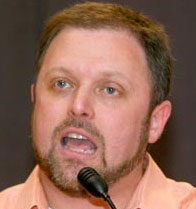 ‘‘Folks of color, and particularly Black folks, are being hit the hardest and that’s not all that unusual. ... But what makes it more complicated is that in this particular situation with a Black president, there’s a real question as to whether or not he feels politically as though he can do anything about that. It’s almost as if the problem of Black unemployment and Black economic depression is more off the table than ever.’ –Tim Wise, anti-racism activist and author |
“Basically the ideological opposition, the just downright unwillingness of the Conservatives to work at all with this president has a lot to do with ideology but I think the additional hatred has to do with race,” he said.
“Then, LeBron James fulfills his seven year commitment with Cleveland, becomes a free agent, and then is vilified in Cleveland for making a business decision that's in his best interest.So that raises the question in my mind, when is a free agent not free?When he's African American,” Dr. Leon said.
Although President Obama really doesn't address race, Mr. Wise said, the president's opponents try to portray his every step as racial pay back. If the president is going to get attacked on race, he might as well speak about and address the issues, Mr. Wise argued.
Glenn Beck, conservative Fox TV talk show host, has charged President Obama set up universal healthcare, college opportunity, green jobs and payments to Black farmers for past discrimination as back-door reparations, and Rush Limbaugh, right wing talk radio host, called the president's economic program “reparations.”
“The general population and population of social justice activists led by people of color, led by Black folks are going to have to keep demanding these issues be kept on the table.I think that at this point there's very little to be lost from elevating these issues,” said Mr. Wise.
“If the base feels taken for granted, as I think many people do and understandably so, then this president isn't going to win re-election,” and that would have a rippling effect, Mr. Wise said.
Obama wins shouldn't be forgotten
According to Dr. Anthony Samad, an author and syndicated columnist, President Obama brought some positives like healthcare reform in 2010 and people should not let the right wing nor his other detractors bury such accomplishments.
Dr. Samad feels that a priority for Blacks should be the disappearance of work and failing education. In urban cities, he said, Black male unemployment ranks between 40-50 percent so Blacks will have to make work to sustain themselves.
“I also think that with education, this president has put more money in alternative education models than any other president in America, yet, it won't affect our children because the majority of them are still stuck in public education systems that are failing them significantly,” Dr. Samad said.
But since the majority of children receive public education, Blacks can't allow it to be disbanded, but must force education to be competitive, Dr. Samad said.
“Public education is going to get its money whether it produces an efficient outcome or not. For instance if you were to produce an inefficient outcome on your job, you wouldn't get paid because you would be producing an inferior product that no one would buy or you wouldn't be able to pass it off as best in its market. Yet we continually allow the majority of children in public education to fail,” he said.
In addition to improving education, said Ronald Hampton, former executive director of the Washington, D.C.-based National Black Police Association, the country must put a greater emphasis on police reform and police brutality in the next year.
2010 was like a tale of two cities, he said. “An off duty African American police officer was shot by White colleagues in Westchester County, N.Y. There were several cases in Mississippi, Florida, Atlanta, in Prince Georges County, Md., the student at Pace University, and of course, Oscar Grant in Oakland, Calif.All of these things tend to keep coming up and I guess there's some expectation on our community's part that because we have an African American attorney general, and a new Justice Department, there's going to be much more aggressive enforcement in that area. But it's been very slow in terms of getting results,” Mr. Hampton said.
If 2011 is going to be a good year, then the country has to stem the tide of police abuse but it's not just enough to have a strong federal Department of Justice, he added. Local police departments have to hold rogue cops accountable, said Mr. Hampton.
“The other thing people have to remember is that entry into the criminal justice system is still arrests; and if we incarcerate more people than any other country, then we must be arresting more people too but what are the components? Why are we doing that? We prison reform activists are looking into the answers to these questions,” Mr. Hampton said.
The Democratic Party has received near unanimous support from Black voters but Blacks haven't gotten a good return and the party may have lost the will to fight. Dr. Greg Carr, chair of the Howard University Department of African American Studies, said, “What appears to be the unilateral disarmament of the Democratic Party at this year's end, really speaks to in some ways, the fact that 2010 may be less significant as a single year and more significant in terms of the arc of the last couple of years.
“The extension of the Bush tax cuts for example, really reveals that in many ways, the Obama administration, for all its relatively progressive work as it relates to healthcare, as it relates reform, still in many ways is following the arc of the previous administration, the Bush administration. In a lot of ways, 2010 has been an extension of a long descent into a kind of neo-liberal, corporation-run state that began in the late 1970s,” he said.
“Some of the things we saw for example this year, beginning of course in January with the tragedy in Haiti and the immediate deployment of finance capital to that island nation to ‘seize the opportunity'—in the words of Naomi Klein; to the campaign finance law that the Supreme Court decided on a Court that is decidedly tilted toward the kind of neo-liberal, if not conservative agenda, that opened up the way for the election results that we saw in November. What we saw was a continuing reiteration of the corporate state,” he said.
Though corporations had record profits massive unemployment remains, said the political scientist. “In fact, unemployment now, certainly the soaring unemployment, combined with the rise in income inequality, marked 2010 simply as the continuation of a long cycle of the concentration of wealth in this country in the hands of the super-rich, the ultra-rich.
“I think what we have to look forward to in 2011, however, is a real opportunity for people to organize and to come together as communities, to press, certainly the president, who now begins his campaign for re-election, to deal and address the fundamental questions of institutional authority,” said Dr. Leon.
“So I think that's what we've got to look forward to in 2011, organizing locally and in communities, to transform our communities and not really waiting on politicians. That is the lesson of Obama.”
Dr. Clarence Lusane, associate professor of International Studies at American University, gave the president a “B” grade for effort, but probably a “C” for achievement.
“I think that the Democrats in Congress, pushed by the president, were able to push through a large number of pieces of legislation. But on a number of areas, there were too many compromises, and I think there was too much timidity on the part of the White House, so it created the space for the extremism of the Republicans to push back. And I think the administration is going to have to use a much more aggressive kind of strategies for the next two years, because they're simply not going to get what they want by compromising,” he said.
“There's certainly a great deal of frustration by many of the people who supported the president. There were a number of promises that were made, big promises that have not been fulfilled. From closing Guantanamo, to ending the war in Afghanistan, to passing the kind of healthcare policies that the people who supported him wanted.
“I think there's going to be a great deal of work that has to be done to bring that constituency back into the fold, particularly among young people and among independents. I think those were the constituencies that disappeared in the 2010 elections.
“My biggest frustration, I think, is with the tone of the political discourse and that to me, seems to have been surrendered to the conservative side of the aisle. Discussions on poverty, on the poor, on interests of working people, on environmental health, all of these discussions have shifted to the right. And when there is a call for Obama to move to the center, the center itself is moving to the right,” said Dr. Lusane.
For some prominent members of the community, 2010 served as a wakeup call to Black America that economic independence is a necessary solution to address societal ills that have been hindrances for too long.
Nestled within the dark cloud of financial and economic despair and massive unemployment lays a silver lining, which is the growing realization that the “Do For Self” economic program and blueprint of the Most Honorable Elijah Muhammad is not only necessary, but is crucial for Black revitalization and community development, say many.
“Look, we have to be entrepreneurs, we have to start thinking about how do we cultivate our own money, cultivate our own food, cultivate our own positioning because once we start doing that then we realize that you know what, we don't need the government to save us,” said attorney and nationally syndicated Radio One talk show host Warren Ballentine. The popular media personality known as “the people's attorney,” a Chicago native, spent much of 2010 on the airwaves encouraging his listeners not only to pool their monetary resources, but to invest with one another as well.
“We don't need the approval of anybody else because we have enough educated and talented people in our own community to be able to provide for everything that we may want or need,” he told The Final Call in a telephone interview.
Through his encouragement, Mr. Ballentine's listening audience deposited over $800,000 in a Black-owned bank during the latter part of 2010. Unemployment, he said, has forced Blacks to come together and do business with one another.
Businessman and author George Fraser warned the economic situation is going to get worse before it gets better. So it is imperative that Blacks develop multiple streams of income, develop marketable skills and attend business conferences and workshops to develop business acumen, he advised. “This is the worst economic depression of our generation. I'm 65 years old, I've not seen it like this in my lifetime,” said Mr. Fraser, whose business network includes thousands of Black businesses and professionals. “You better have not only a plan A but you better have a plan B … You've got to think outside of the box and you've got to try new things.”
Dr. Na'im Akbar, clinical psychologist, said one of the realities that should have been learned in 2010 is Blacks cannot depend on outer society to solve problems. “We can't depend on the government, we can't depend on the president, be he Black or White, Republican or Democrat. We can't depend on anybody outside of our own selves to solve our issues as a people,” said Dr. Akbar to The Final Call.
By constantly trying to look for someone else to solve the problems that we have on a personal, economic or collective level we are going to always run into disappointment, he said.
“We are witnessing the manifestation and the unfolding of the proof of the prophesies of the truth brought to us by the Most Honorable Elijah Muhammad now through the Honorable Minister Louis Farrakhan that we must ‘Do For Self,' ” said attorney and general counsel for the Nation of Islam Abdul Arif Muhammad.
